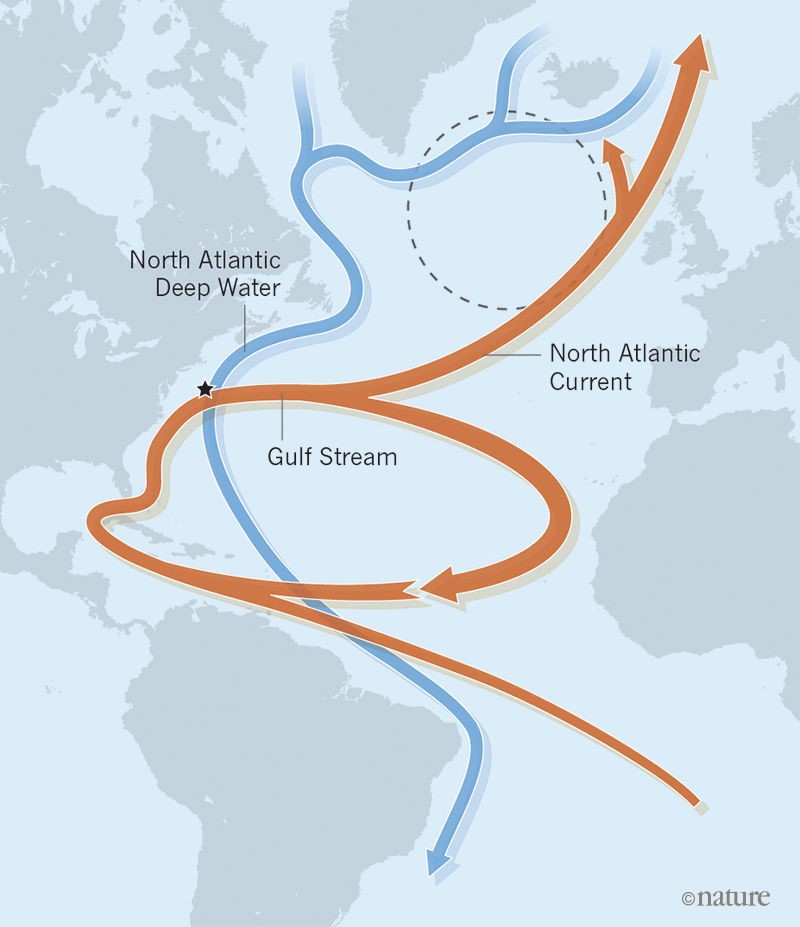Atlantic Meridional Overturning Circulation (AMOC) Weakening: Implications For The US

Table of Contents
Sea Level Rise and Coastal Erosion in the US due to AMOC Weakening
The AMOC plays a vital role in regulating sea levels along the US East Coast. A weaker AMOC can lead to a rise in sea levels, primarily because of thermal expansion of water and changes in the balance between ice melt and ocean currents. This rise, coupled with increased storm surge activity, significantly exacerbates coastal erosion and flooding. Areas like Florida, Louisiana, and the Mid-Atlantic states are particularly vulnerable.
- Increased storm surges: A weaker AMOC can lead to more intense and frequent storm surges, pushing seawater further inland and causing greater damage.
- Accelerated beach erosion: The combination of rising sea levels and stronger storms leads to rapid beach erosion, threatening coastal infrastructure and property.
- Higher flood insurance costs: As the risk of flooding increases, insurance premiums are expected to rise substantially, placing a significant burden on coastal communities.
- Displacement of coastal communities: The increasing frequency and severity of coastal flooding could force the displacement of residents from vulnerable areas, creating significant social and economic challenges.
Changes in Weather Patterns and Extreme Weather Events
AMOC weakening is projected to alter weather patterns across the US, resulting in more frequent and intense extreme weather events. The disruption of the ocean current system can lead to changes in atmospheric circulation, impacting temperature and precipitation patterns.
- More frequent and severe droughts in the South and Midwest: Reduced moisture transport from the Gulf of Mexico could lead to prolonged droughts, impacting agriculture and water resources.
- Increased intensity of winter storms in the Northeast: A weaker AMOC might lead to colder temperatures and more intense winter storms in the Northeast, resulting in power outages, transportation disruptions, and economic losses.
- Changes in hurricane tracks and intensity: While the exact impact on hurricane activity is still under research, some studies suggest potential alterations in hurricane tracks and intensities due to AMOC changes.
- Impacts on agricultural yields and food security: Changes in temperature and precipitation patterns can negatively affect crop yields, threatening food security and impacting the agricultural economy.
Impacts on Marine Ecosystems and Fisheries
The AMOC is a major driver of ocean currents and water temperature, playing a crucial role in supporting marine ecosystems. A weaker AMOC can lead to significant changes in ocean conditions, impacting marine life and fisheries.
- Changes in fish distribution and abundance: Alterations in water temperature and currents can shift the distribution of fish populations, impacting commercial fishing activities.
- Impacts on shellfish and other marine invertebrates: Changes in water temperature and salinity can negatively affect shellfish and other invertebrates, impacting their growth, reproduction, and survival.
- Economic losses for fishing communities: Declines in fish stocks and changes in fish distribution can lead to significant economic losses for fishing communities that depend on these resources.
- Potential for species extinctions: Some species may be unable to adapt to the rapid changes in ocean conditions, leading to local or even global extinctions.
Economic and Societal Impacts of AMOC Weakening in the US
The consequences of a weakening AMOC extend beyond environmental impacts, significantly affecting the US economy and society.
- Increased costs for infrastructure repair and maintenance: More frequent and severe storms, coastal erosion, and flooding will require significant investments in infrastructure repair and maintenance.
- Decline in tourism revenue in coastal areas: Damage to coastal infrastructure and the increased risk of extreme weather events can deter tourists, impacting the tourism sector.
- Increased healthcare costs related to heat-related illnesses: More frequent and intense heatwaves can lead to increased cases of heatstroke and other heat-related illnesses, increasing healthcare costs.
- Economic burden on taxpayers and insurance companies: The economic burden of adapting to and mitigating the effects of AMOC weakening will ultimately fall on taxpayers and insurance companies.
Conclusion: Addressing the Challenges of a Weakening AMOC and Protecting the US
The weakening of the Atlantic Meridional Overturning Circulation poses significant challenges to the United States, impacting coastal communities, weather patterns, marine ecosystems, and the economy. The urgency of addressing climate change to mitigate further AMOC slowdown cannot be overstated. We must act decisively to reduce greenhouse gas emissions and invest in adaptation strategies to protect ourselves from the potentially devastating consequences of a weakened AMOC. Learn more about AMOC and its impact, and support policies aimed at reducing greenhouse gas emissions and building resilience to climate change. The future of the US, and indeed the global climate, depends on it. Take action today to protect our future and safeguard the AMOC.

Featured Posts
-
 Top Stake Casino Alternatives In 2025 Best Replacements Reviewed
May 18, 2025
Top Stake Casino Alternatives In 2025 Best Replacements Reviewed
May 18, 2025 -
 Amanda Bynes Joins Only Fans What We Know
May 18, 2025
Amanda Bynes Joins Only Fans What We Know
May 18, 2025 -
 Schwarbers Power Mlb Home Run Prop Picks And Analysis For May 8th
May 18, 2025
Schwarbers Power Mlb Home Run Prop Picks And Analysis For May 8th
May 18, 2025 -
 Brooklyn Assault Man Gropes Woman Simulates Sex Act
May 18, 2025
Brooklyn Assault Man Gropes Woman Simulates Sex Act
May 18, 2025 -
 Hollywoods Portrayal Of Casinos In Film And Television
May 18, 2025
Hollywoods Portrayal Of Casinos In Film And Television
May 18, 2025
